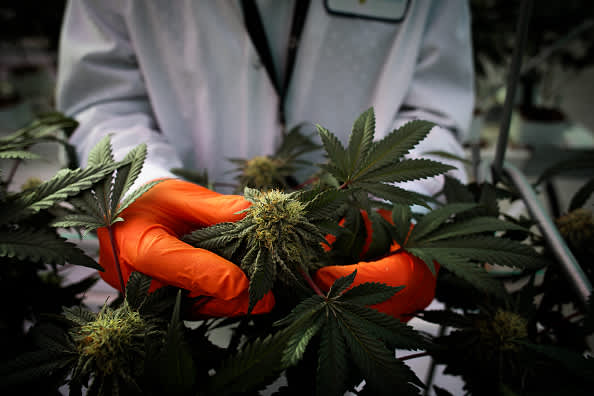Cannabis stocks slump for second straight week as prospects dim for nationwide legalization

A worker inspects cannabis plants inside the grow room at the Aphria Inc. Diamond facility in Leamington, Ontario, Canada, on Wednesday, Jan. 13, 2021. Tilray Inc. and Aphria Inc. agreed to combine their operations, forming a new giant in the fast-growing cannabis industry.
Annie Sakkab | Bloomberg | Getty Images
For stocks with names such as Curaleaf Holdings, GrowGeneration and Aurora Cannabis, the buzz appears to be wearing off.
As part of the market sell-off that hammered technology and other growth areas over the past couple of weeks, investors also dumped cannabis producers and distributors, which had been huge outperformers during the pandemic months.
The AdvisorShares Pure Cannabis ETF, which consists of growers and developers of cannabinoid-based medicines, dropped 8.5%, following a 9.4% decline last week. The Amplify Seymour Cannabis ETF is down 20% over the past two weeks, its biggest drop since March of last year.
Most of the top cannabis companies are based in Canada, where the plant has been legal for recreational ingestion since 2018. The U.S. has almost 10 times as many people as Canada, and distributors are anxiously awaiting their opportunity to expand to the south.
Weed stocks drop
For a while, things were looking good.
Weed stocks rallied after Joe Biden was elected president in November, and then again in January after Democrats secured the Senate majority with two victories in the Georgia runoff election. Investors cheered the results, believing that Democrats would take actions to legalize cannabis at a federal level, following votes in November to allow recreational weed in Arizona, Montana, New Jersey and South Dakota. They joined 11 other states that had already legalized pot.
Senate Democrats promised sweeping legislation that would end the federal prohibition on marijuana and an end to the war on drugs.
"Ending the federal marijuana prohibition is necessary to right the wrongs of this failed war and end decades of harm inflicted on communities of color across the country," wrote Senate Majority Leader Chuck Schumer of New York, along with Sens. Cory Booker of New Jersey and Ron Wyden of Oregon, in a statement on Feb. 1.
Where are the Republicans?
But working across the aisle won't be easy, and Democrats need some Republican counterparts to pass any meaningful legislation. If the Covid-19 relief bill is any indication, the prospects for bipartisanship are grim. Not a single Senate Republican has signed onto the $1.9 trillion package.
Matt Bottomley, an analyst covering the cannabis sector at Canaccord Genuity, called out the political challenges in a report last month on Canopy Growth, which owns marijuana retailers and brands that produce cannabis-based products. He lowered his rating to sell after the company's quarterly results mostly because of "significant valuation appreciation" since October.
"The sector continues to see value appreciation as a function of positive macro headlines coming out of the US (Biden presidency; Democratic control of Senate; commitment to push US cannabis reform at the federal level)," Bottomley wrote. "We do not foresee federal cannabis legalization in the US anytime soon and believe CGC's value appreciation as of late is likely not met with corresponding fundamental upside at this time."
Canopy Growth has dropped 19% in the past two weeks.
Among the biggest decliners this week was Aphria, which agreed in December to merge with Tilray into what will be the largest cannabis company by revenue. Aphria, which produces medicinal and recreational cannabis, plummeted 13% after falling 11% last week. It's the worst two-week performance for the stock since a four-week plunge between February and March of last year.
Aphria CEO Irwin Simon told CNBC last month that he expects marijuana to be legalized in the U.S. within the next few years but said it could happen sooner in places such as Germany and Portugal.
"There's a lot of unknown about what will happen in the U.S., but we'll have the balance sheet, we'll have the knowledge, we'll have the brands, we'll have the technology to be able to make a major impact once legalization happens," Simon said Feb. 24 on "Closing Bell." "I say full legalization in the next two to three years."
Shares of Tilray, a research, cultivation and distribution company, dropped 12% this week following last week's 17% decline.
The slump has hit the whole industry.
Curaleaf, a provider of health and wellness products, dropped 12% in two weeks, while GrowGeneration, an online store for growing supplies, plummeted 31% and cannabinoid provider Aurora Cannabis fell more than 20%.
WATCH: Pot stocks slide in latest round of Reddit-fueled volatility
Source
Check Our More
No comments